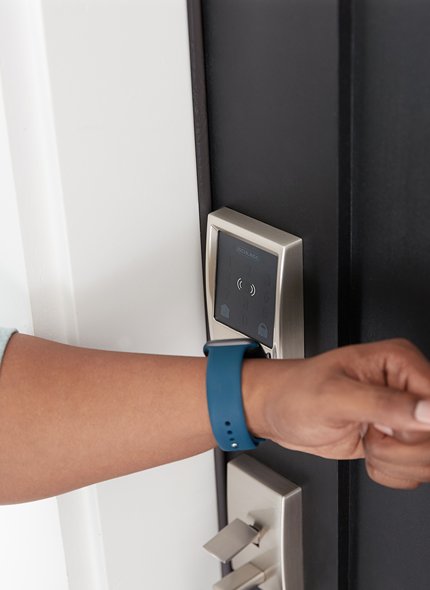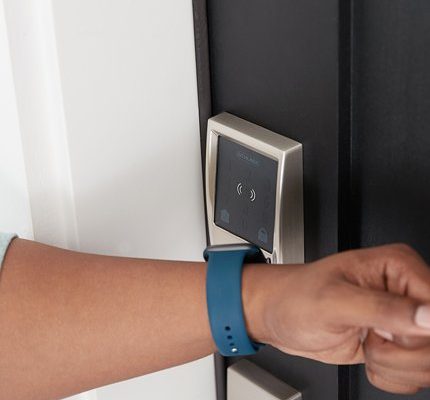
Let me explain what’s really happening when a smart lock hums or buzzes. These locks aren’t just regular deadbolts with a battery—they’re mini-machines with motors, electronics, and (sometimes) wireless connections, all squeezed inside. That innocent sound is usually the first way your lock “talks” to you, and it’s worth learning what it’s trying to say—before you grab your tools or call for help.
What Causes a Smart Lock to Make Noise?
You might be wondering, “Is it normal for my smart lock to buzz or hum at all?” Here’s the thing: a little noise during regular use—like locking or unlocking—is totally normal for most smart locks. Inside, there’s a tiny motor doing the heavy lifting. It clicks, whirs, or even makes a soft hum as it moves the deadbolt.
But if you’re hearing constant humming (not just during locking/unlocking), that’s not normal. Continual noise usually means something is running when it shouldn’t be. It could be a stuck motor or a jammed mechanism, or maybe the lock is trying (and failing) to finish a command.
For example, if you recently installed a Lockly or Kwikset smart lock and there’s a steady buzz coming from the door, that’s the kind of signal you want to pay attention to. Ignoring it could drain your battery quickly, or even wear out the lock’s motor for good.
Tip: Momentary sounds are fine. Ongoing hums or buzzing? That’s a red flag.
Is It a Low Battery or Power Issue?
Low battery is hands-down the most common reason for a smart lock to buzz or hum. Here’s why: when batteries get weak, the motor inside your lock can struggle to move the deadbolt fully. Instead of working smoothly, it pulses, vibrates, or just stalls partway—hence the buzzing.
A lot of people think a smart lock just stops working when the battery dies, but that’s not always true. Sometimes, it’ll try to finish its job, over and over, making a constant noise until there’s zero power left. If you’ve got a keyless lock from Yale, August, or Eufy, and you haven’t changed the batteries in months, this is probably the culprit.
- Check your battery status: Open the app if your lock has one, or look for a flashing light or warning beep.
- Try new batteries: If replacing the batteries stops the noise, you’ve found your answer.
Just a heads up, a power issue can also pop up with smart locks that are hardwired (rare, but it happens). A loose wire or weak outlet can cause the motor to “stutter,” leading to that humming sound.
Motor Stuck or Jammed? Here’s What Happens
Inside every smart lock is a tiny gear-driven motor. It’s smart, but not *that* smart. If the deadbolt is misaligned, or something’s blocking its path, the motor keeps trying to move—sometimes buzzing or humming as it strains against the jam.
Picture this: You install your Schlage Encode smart lock, but the strike plate on the door frame doesn’t line up perfectly. Every time the lock tries to engage, it gets stuck, so the motor keeps spinning in place. This “motor stall” sound is usually lower in pitch, kind of like a soft buzz that just won’t quit.
- Common causes: Door swelling from humidity, loose screws, or a bent latch.
- How to check: Unlock the door manually and see if it moves freely. If not, you’ll need to realign the hardware or call a locksmith.
Honestly, ignoring a jam like this can ruin your lock’s motor over time. It’s the equivalent of holding down your car’s starter even when the engine’s on—eventually, something’s gonna give.
Software Glitches and Repeated Commands
Sometimes, your smart lock’s constant humming isn’t mechanical—it’s digital. Every smart lock runs on a tiny computer, using software (firmware) to manage its motor, wireless signals, and even things like auto-lock timers. If something in the code goes haywire, your lock can get stuck in a loop, sending the “lock” or “unlock” command over and over.
You might see this after a failed update, a botched pairing with your app or remote, or if the wireless signal gets interrupted while it’s syncing with your home hub. For example, if you’re using a Z-Wave or Wi-Fi-enabled smart lock that suddenly starts buzzing after you tried to pair it with your smart home system, software could be to blame.
- Try a reset: Most locks have a pinhole or button for resetting. Check your manual for exact steps.
- Re-pair with your app: Remove the lock from your app’s device list, then add it back in after the reset.
Insight: Just like computers, sometimes smart locks need a restart to fix random bugs.
How to Troubleshoot a Buzzing Smart Lock
If your smart lock just won’t stop humming, take a breath—most problems are easy to fix with a little patience and the right steps. Here’s a simple troubleshooting guide:
- Check the batteries. Swap in a fresh set, even if the old ones look fine.
- Try to operate the deadbolt manually. If it sticks or feels rough, check for alignment problems or debris in the lock.
- Listen for patterns. Does the buzzing happen only during locking/unlocking, or is it truly constant?
- Reset the lock’s software. Use the reset feature, then re-sync with your app or remote.
- Inspect electrical connections. If your lock is wired, make sure no cords are loose or pinched.
Don’t be afraid to call support if you’re stuck. Most brands (like Schlage, August, and Yale) have great troubleshooting guides or phone help.
When Is It Time to Replace the Lock?
Honestly, if you’ve tried everything and your smart lock is still buzzing non-stop, it might be time to admit defeat. Motors can burn out, especially after months of struggling against a jam or running low on battery. Electronics can fail, too—sometimes a control board just goes bad.
If your lock is out of warranty or the cost of repair is close to buying a new one, replacing it makes more sense. At this point, you get peace of mind, a fresh warranty, and (usually) upgraded features. If your home security is at stake, don’t wait too long.
It may also be worth looking at other brands or models—sometimes a universal smart lock fits your door better, or comes with sturdier hardware for high-traffic use. Just make sure to check compatibility with your smart home system before making the switch.
Comparing Different Smart Lock Brands and Their Noises
Not all smart locks make the same kind of noise, even when they’re working perfectly. For example, August and Yale smart locks are known for being almost silent, with just a soft *click* or gentle hum during operation. On the other hand, some Schlage and Kwikset models can be a bit louder, thanks to bigger motors or sturdier hardware.
Here’s how some popular brands stack up:
| Brand | Typical Sound | Common Issues |
| August | Soft mechanical hum, brief | Battery drain, firmware bugs |
| Yale | Nearly silent, faint motor buzz | Jams if deadbolt misaligned |
| Schlage | Noticeable whir or clicking | Stuck motor with misalignment |
| Kwikset | Low electric buzz, sometimes louder gears | Frequent battery warnings |
If your lock is suddenly way louder than before, even compared to similar models, it’s worth investigating why.
How Regular Maintenance Helps Prevent Buzzing
You might not think about “maintaining” a smart lock, but a little regular care goes a long way. Over time, dust, humidity, and everyday use can make parts wear out or stick. That’s when motors start to hum and gears get noisy.
- Clean the mechanism: Wipe down the deadbolt and hardware with a dry cloth every few months. Avoid spraying cleaners inside.
- Lubricate as needed: Use a silicone-based lubricant if the deadbolt feels stiff—but never use oil-based sprays, as they attract dust.
- Update firmware: Check your app for software updates. New updates can fix bugs that cause strange noises or sync issues with your remote or app.
- Replace batteries before they die: Don’t wait for your lock to stop working. Swap them out as soon as you get a low-battery warning.
Taking these simple steps can keep your smart lock quiet, smooth, and working longer—no buzzing needed.
Closing Thoughts: Don’t Ignore That Buzz
When your smart lock buzzes or hums constantly, it’s more than just a minor annoyance—it’s your lock’s way of asking for help. Whether it’s a low battery, a stubborn jam, or a digital glitch, there’s always a reason behind the noise. Learning what your August, Yale, Schlage, or Kwikset lock is trying to “say” can save you time, frustration, and even keep your home secure.
If in doubt, a fresh set of batteries and a little troubleshooting can fix most problems right away. And if your lock’s time is up, replacing it with a better-fitting model is always an option. Either way, don’t let that hum blend into the background—pay attention, and your smart lock will thank you by staying safe and silent.
